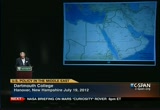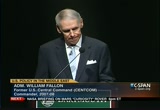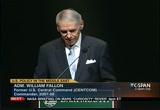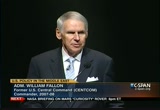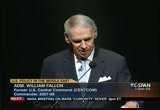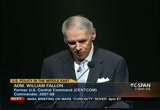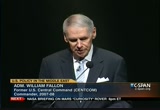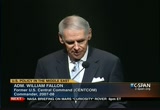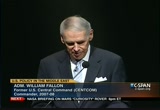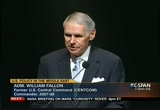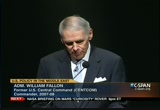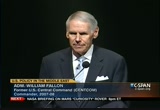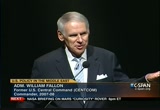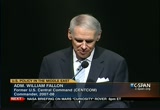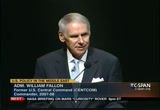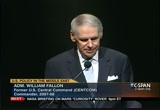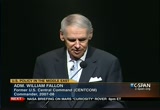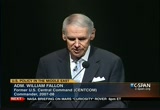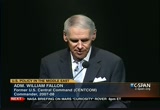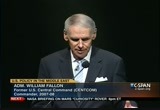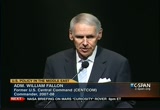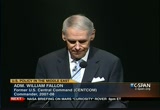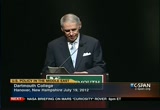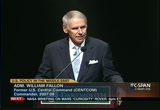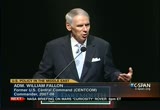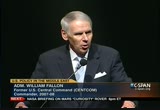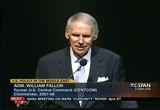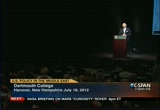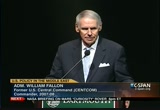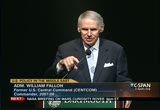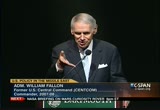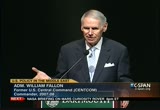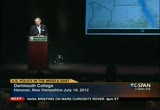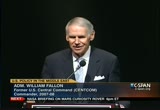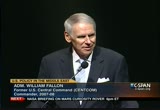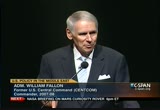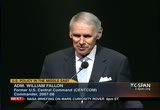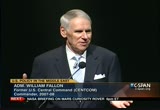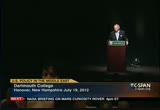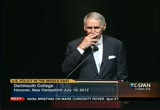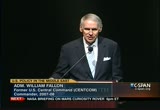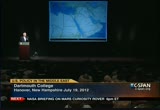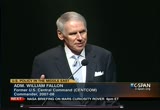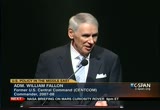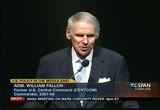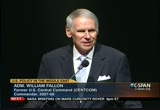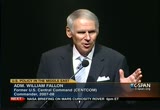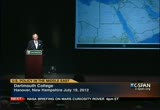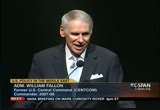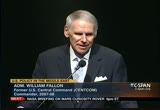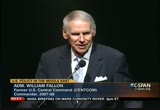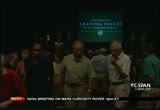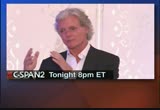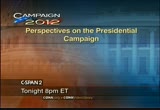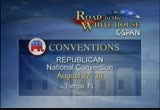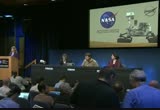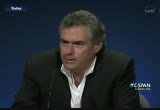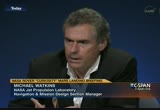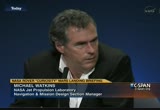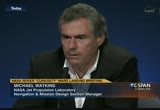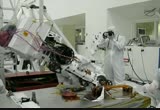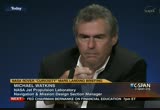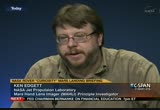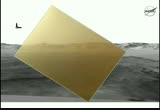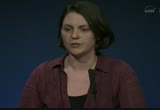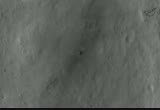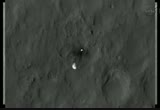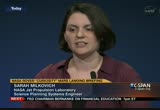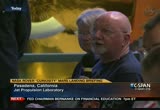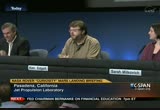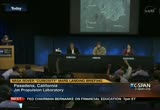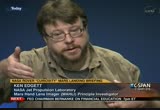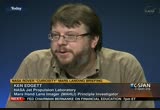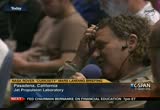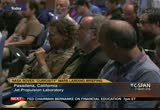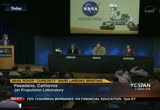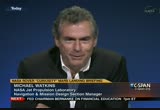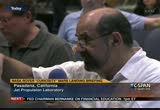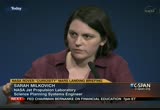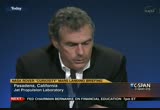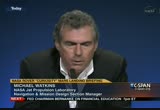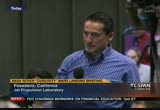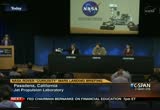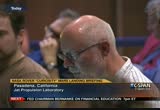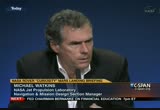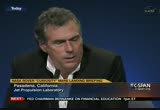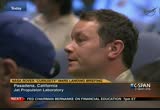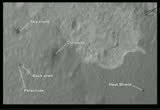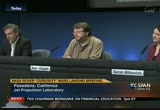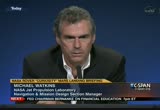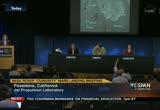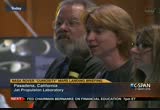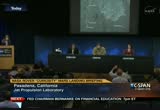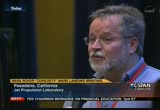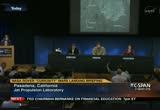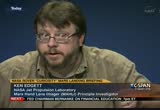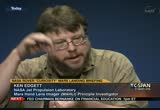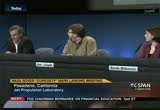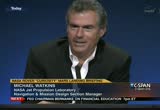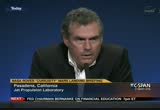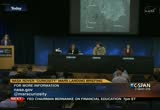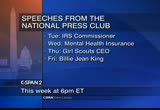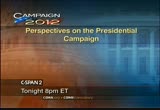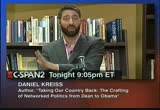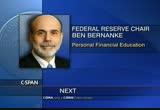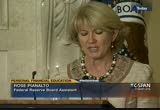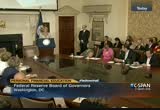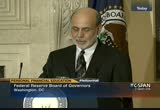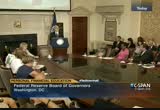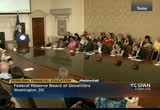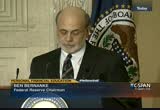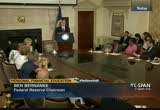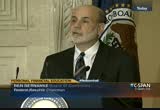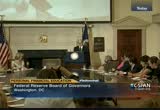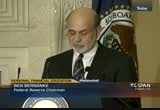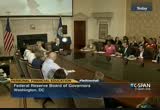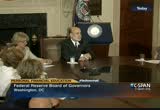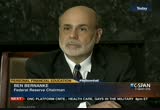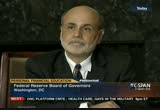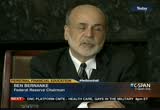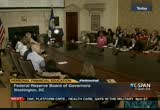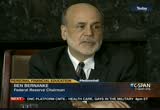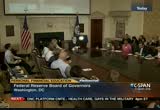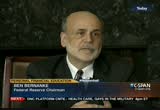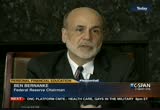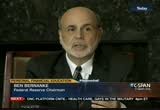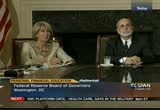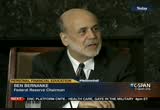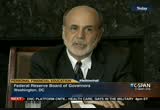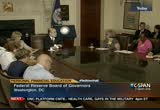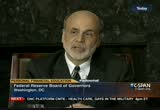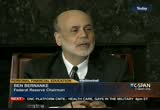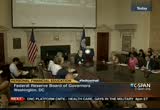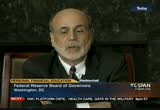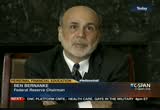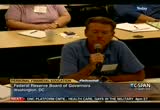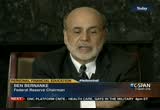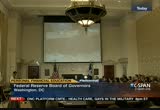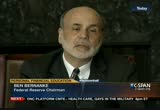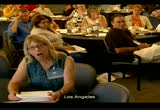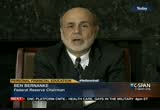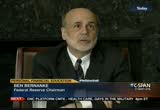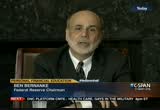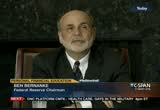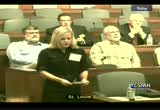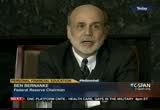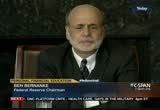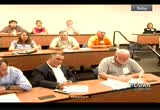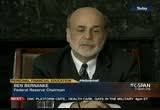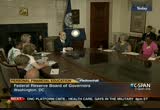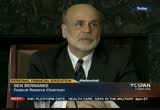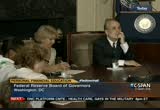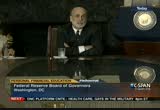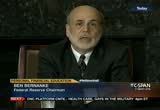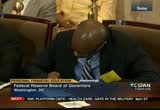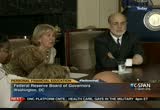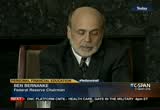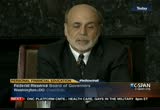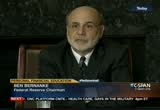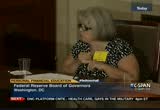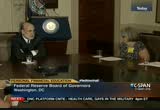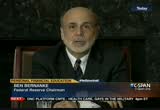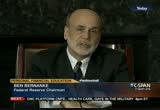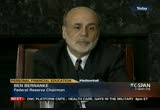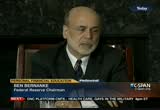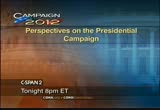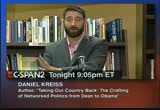tv U.S. House of Representatives CSPAN August 7, 2012 5:00pm-8:00pm EDT
5:00 pm
purity and stability. we mentioned previously but to emphasize again the interdependence ad counter activity of world econmies guarantees the impact of events, good or otherwise, in this region, for world economic and political entities. given the near instantaneous transmission of information around the world, the combination of high energy demand, limited reserves and nearly continuous turmoil and attention on the region. the latest anxiety and potential for interference or manipulation of the energy flow. segueing into the topic of security is a drivinfactor of interest for the u.s. we note in stability, conflict in wars are continuous
5:01 pm
hallmarks. the postcolonial era in the region is featured conflict of one kind or another spending the entire middle east through the north african are and beyond the call. in addition to concern about energy resources, the region ature commonly in the cold war. and witnessed the emergence of authoritarian leaders almost everywhere. the creation of the state of israel has proven to be an enduring flashpoint in arab and israeli relations. in a split up since the 1940s. the u.s. has had a robust marathon presence the end of world r ii. but only a modest few ships in the gulf through the 1970s. u.s. military forces became much more attentive with the rhizome rise of the iranian revolution
5:02 pm
procedure of the iraqi war in 1980. it was a series of bloodletting that was in the status quo antebellum between iraq and iran. president jimmy carter came into office not long after the oil embargo in 1973. having been deeply disturbed of the economic impact and u.s. dependency, he famously declared the energy crisis the moral equivalent of war. this concern heightened by events in iran and the soviet invasion of afghanistan, led to another declaration, the so-called carter doctrine, as stated by predent carter in his state of the union address
5:03 pm
in january, 1980. let our position be absolutely clear. an attempt by an outside force to gain control of the persian gulf region will be regarded as an assault on the united states of america in such an assault will be repelled by any means necessary, including military force. this message was aimed primarily at the soviet union. this restatement of previous and more general warnings by truman and nixon, started wheels turning in washington and elsewhere. in fact, the time the u.s. had scant military capability in the region. and it recently begun strategizing about potential middle east contingencies. establish a task force was directed to focus on the area with the aim of ensuring stability and commerce. a few years later under president reagan, that reservation was upgraded to full
5:04 pm
combatant status as the united states central command. the high-level military attention that continues today was institutnalized man. u.s. forces, again, primarily marathon, began spending more time particularly in the gulf. with both wrong in iraq as tey jockey for advantage. throhout the 1980s. relations between the u.s. and around were contentious, setting the stage for what has become a decade-long of animosity, distrust and posture. this has evolved to the situation today in which iran is working hard to achieve an upper hand against preemptive action and nuclear weapons capabilities. saddam hussein's invasion of kuwait in 1990 and the resulting us-led coalition from iraqi
5:05 pm
forces led to the first large-scale introduction of u.s. ground and air forces for the region. this influx of man and woman power and culture was viewed with anxiety and the gulf states. especially in the kingdom of saudi arabia. but it's a good, albeit reluctantly, in order to counter the aggression. expulsion of saddam's forces from kuwait featured a diverse coalition of forces and throughout the region, carefully assembled by the u.s. and is is considered the high watermark of regional security cooperation debate. iran, of course, did not join the coalition despite a decade-long colict with iraq, in fact, agreed to terms ending hostilities with saddam, shortly after the latter invaded kuwait. in the aftermath of t first gulf war, u.s. retained a higher profile military presence in the
5:06 pm
region. mostly naval and air forces, but including a substantial ground capability in kuwait. the focus now is to contain iraq, as if saddam continues suppression in the south of iraq, threatening neighbors against western interference. it is noteworthy that eventually all u.s. military presence is were removed from the kingdom of saudi arabia. tensions remained high in the '90s as they frustrated every effort to stabilize th region. despite enthusiaic intentions by president george h. w. bush and his administration, to leverage the cooperaon experienced during the gulf war to encourage settlements of these really in palestinian issue, no real progress was realized and that security situation continued to feature almost constant conflict by
5:07 pm
military and terrorist actions and all-too-familiar creature of the amnesty between the sides. attacks against the u.s. on september 11, 2001, headlined the seriousness of security threats posed by radical islamists, organized by al qaeda on the direction of osama bin laden. these attack attacks had huge repercussions on the world. the complexity and enormity of regional security issues and second, the consequences of perception by people. it is ironic that many of the radicals that caused so much pain and last decade, were the same people who we supported with financial material resources just a few years previously in afghanistan and the struggle against the
5:08 pm
soviets. the complex and seemingly contradictory lines of activity in the region merit our attention an attempt at understanding. the second issue here of perceptions, our own people in the region is related to the previous one. a key attribute of our perception of the middle east is generalization. a common incnation for simple understanding but one fraught with peril was to know our differences but people won't together. this oversimplified perception coupled with the enormity of fear, outrage and the desire for retaliation, which ripped our nation and elsewhere, post 9/11, complicated our ability to plan strategically. we would do well to remember that the middle east defines generalization. after 9/11 we witnessed afghanistan to expel al qaeda,
5:09 pm
the invasion of iraq in increang hostility and relations with iran and the movement of forces throughout the nation. let me summarize recent security issues and the repercussions today. the wars in iraq and afghanistan and their consequences. finally, the continued threat of radils enter attacks supported by regional entities. linkages about that, lingering mistrust of u.s. intentions continues to motivate potential terrorists. we are foced on regime change, following the iraqi model. u.s. support for recently deposed and currently challenge governments is viewed with great
5:10 pm
suspicion. moving to the social dimensis of u.s. policy, we were immediately in uncharted waters. e unprecedented events commonly referred to as the arab spring, have challenged conventional thinking and appear to be moving in multiple directions. first, let's talk about some background. after our initial foray in the 19th century, the significant event next to occur in the region was president franklin delano roosevelt on his way back from tehran, he went to malta and including egypt, and then boarded a u.s. navy ship, interestingly. which set sail for the great lake. in a period of a day and a half,
5:11 pm
president roosevelt entertained free three visitors. images and pictures of him at the time showed a serious situation and how ill he was. en he asked to meet with three leaders in the region. , individually, first, mahmoud ahmadinejad from saudi arabia. king farouk of egypt. in the emperor of ethiopia. iam seeing pictures of these events and they were entertning if nothing else. a picture of this, it was a u.s. navy heavy cruiser with guns and anchors in the middle of the
5:12 pm
lake. part of the suez canal passage. along comes the destroyer, bearing the king of saudi arabia and his entourage, which were in the hundreds. they all came aboard and pictures of the king and the president sitting together. in the line of what must be 100 watching intently. it is noteworthy that politics, nooil, highlighted each of these conversations with the president. king faroukas interested in getting out of egypt. the king returned to ethiopia.
5:13 pm
a very strenuous terms, against the formation of the jewish state. as we know, the end of control, which borders arbitrarily he powers set in motion events and activities which vexed policymakers today. governments which replaced the orioles were headed without exception at one time or another. the absence of democracy, individuals and groups, including well-known entities like the muslim brotherhood in the [inaudible name] party, generally did little to address the need of advancements of individual citizens. with the cold war's backdrop, regional leaders often they
5:14 pm
were, seeking economic and military support, and we usually reward them for their cooperation by the great powers. the u.s. has often found itself in regional policy dilemmas, as it strives to boost democratic processes, yet not alienate longtime supporters who are otherwise stable economic security arrangements. ultimately, vertical sediments and solutions must be found and should be the long-term aim of the united states. but where to focus first to with issues in the region, it is understandable tt policymakers are often challenged with the issue du jour. something comes up every day. and we have to deal with it.
5:15 pm
but we do it at the expense of the long-term issues. the three big challenges in the region today that overshadow all else, by the way their linkage between these two, first, the uprisings and protest are in record numbers. second, upon its request for nuclear weapons while continuing to inflate revolution and export terrorism. third, the long festering impasse between the israelis and palestinians. me are of the view that if only palestine were solved, everything else would be resolved. i don't embrace that view. but i do believe that a solution, no doubt imperfect, and not without risk and anxiety must be found for this problem. the status quo is untenable for both parties. the resolution of the conflict is a crucial and vital national security interest of the united states. the u.s., us, american leadership is an essential
5:16 pm
component, catalyst and conference provider if we are ever to see a google lucian accommodates israeli security interests and palestinian sovereignty. iran, with the first shock waves of the postcolonial era itself, woul be to overthrow the shop, has exchged one type of authoritarian rule for the other, albeit with some trappings and government. the right to return tothe historic dominance in the region, but they continue to arrange things to start trouble in and around palestine and israel and neighboring iraq and afghanistan. as with other top issues in the region, this one has many layers of complity, including centuries-old competing, disputes, and anti-americanism as part of their credibility and visions of historic renderer.
5:17 pm
resolution of this issue will involve the u.s. and require a vast rervoir of intern pension anning, terrible executions and a lot of patience. the last of the chaenges is how to deal with the monumental achievements in the end of the colonial period or the popular movements sweeping the region are the clear dicator of dissatisfaction with the recent status quo. out with the old, and easily understood mesge. what remains to be seen is what macs. we have seen a revolution and governing from the past, more often than not, some degree of chaos, or at least untidiness and dues. we are inclined to admire actions that oppose tyrants. the problem, of course, is without her international and institutional structure of governance, the process is a little different. it is no small matter to
5:18 pm
establish the training and experience and checks and balances necessary for a functional government. thchallenge of establishing representative governments, functional government institutions in which citizens have tst and confidence and is daunting and unsettling for us to watch. what should we do? first things first. we must ask ourselves before we can credibly convince oths of the righteousness of our policies. these steps have to be reduced and the government must be put on financial footing that than it sounds. we should fix primary education. it is abysmal in far too many places in this country. we need to refocus innovation and emphasize research and development. that is the future cop,. do not accept mediocrity for fear of offending. it is all too prevalent today. we have an unparalleled legacy of national behavior based on
5:19 pm
principle and values in this country. let's return to basics. let's hold our officials accountable. act responsibly and for the common good. treat people with dignity and demonstrate good behavior. people notice if we offer a good example and walk the talk, we enter policy discussions with credibility and competence. we tend every day business with principled action. policies should follow a description of fairness and collective good and freedom of choice. we don't turn our backs on friends. the principle preference. engaging on the three big issues. bad news with the festering israeli conflict does not get better with time. iran is not just going to melt away in the desert heat.
5:20 pm
the revolutionary wave of self-expression will continue. we can help, by example, and by assisting with the tools of institutional government. this is not easy. it is going to require planning and patience and go full employment of all aspects of american national power. keeping in mind that changes ever present, technology advances with astonishing celebration, human behavior is reliably, if unpredictably, return. 200 years ago, an adolescent found an interest in economy and national reputation, in the middle east and north africa. not a big issue and a long way from home, but vexing. her leaderip established policy decided on a course of action and used the capabilities of government to resolve the issue. the message of those actions
5:21 pm
when a long way to establish the reputation of the united states. we have many good reasons to act as a major power in a beacon of freedom that we have become as a nation. the middle east needs today more than ever, american leadership. the sand will continue to shift, buwe should not shy away. people in the region act on yearning for change, freedom and choice. the region has great geopolitical importance for the u.s. and these are reasoned, thoughtful, and carefully planned engagement. let me finish with a few wines from hov longfellow. we can make our lives sublime and departing, leave behind us, footprints on the sands of time. thanyou very much, you have
5:22 pm
been kind, and i will be happy to try to take your questions. [applause] [inaudible conversations] >> what i learned from iraq, where shall i begin. i have an answer when i showed up on the scene over there actually in 2006 the first time, during the war. the response was i cannot undo what has happened in the past, but i can work on where we are now and what we are going to do in the future. what we did was, the lesson here is that it is extremely complex. before we jump into such endeavors again, we need to do an awful lot of studying, i believe a lot more than we did at that particular time when the
5:23 pm
war began. because the old adage that things are often not as they appear was oh, so true. we learned a lot of hard lessons at every level. some very challenging circumstances, we had engagements that val those of world war ii in intensity and casualties, unfortunately. they went time and again to what they were asked to do. at the end of the day, it is all about people. you have to have a level trust. somebody asked this question today. let's talk about trust. without trust at every level, we can't succeed unless you are a dictat or tyrant and can direct things that happen, not for long. so we spent the better part of the year, trying to build trust
5:24 pm
with the iraqi people. because of the end of the day, it is their country. and they had to step up and take over and solve the problems. it is easy to say from a distance that we should've done that earlier on, but we didn't. they didn't trust us and they weren't sure wt we were going to do. some of them are probably going to walk away the first opportunity and some thought we were never going to go away. and everywhere in between. we have to work at establishing trust, nicky back out of that, you get back to hier things, it's a good thing. we act based on principle and we try every time to do the right thing, to have a measured response to the challenge. it would be nice if everyone in the world were basically dent human beings. they are not, unfortunately. they are not at all. but we spend our too much time, in my opinion, digging ourselves
5:25 pm
out of holes that we jump into instead of taking a preventive step that we could and should be doing and let me give you a couple of examples. there are many troubled areas in the world. areas and regions and people that could use our help in the syem. but we have this aversion to doing things in many cases, spending money to engage in international affairs. it is really tough. it is a tough sell on the hell and i used to try to convince the leaders that he would fund an ounce of prevention today, we would prevent -- look at all the chileans we have whistled away in last decade. i had a fraction of that money, during the early part of the war when i was in the pacific. i was thinking of the good i could do in indonesia and the philippines and malaysia and
5:26 pm
india. i don't mean giving things to people. dead set against the basic welfare business, is empowering them to fix things to get competent at running their countries and running their infrastructure, and they do it. in many cases they need help, our help. this is a much better use of our resource than digging ourselves out. i think we have seen this before. sir? >> i'm sorry, i feel my failed my duty here. i am not supposed to talk until the microphone gets in front of your face. the helpful people will take care of that. >> you talk about spending money. my question is, would you address your thoughts on the
5:27 pm
ceiling and endless desire of the corporate and political prsure by companies that make a lot of money by selling military equipment, what we have now and what s accurae, is that they are trying to force greater expenditures through congress and even the military people are asking for, and if we are the only remaining super power, we over militarized. >> the problem with this is that we live in an era of sound bites and in pinions. and we are constantly bombarded by people who have something to say about an issue of which they generally know little. but they focus on an issue. so let's pick this or that company, who is lobbying to build more at abc or whatever
5:28 pm
that thing may be, and should we buy two of these, 20 of these, or 200 of these. who knows. the bigger picture issues and my sense. we have a decade of expansion of the department of defense budget, and regrettably, most of that money has been whisked over to the side and form plces. during that time. we unfortunately invested very little in the future. the wise household and business does near-term things, midterm things, and long-term planning. in the u.s. government spending arena, that equation is usually out of chilled. so you could find every angle on these arguments and find a piece of this is absolutely accurate
5:29 pm
in the piece that is not accurate. we know that defense spending is going to come down. with certainty. it's started ready and it will continue. exactly what the level is, it remains to be seen. it ought to be $333 billion because i don't have a visibility. but i will tell you one thing. there's an awful lot of stuff that is wasted. and it is wasted for 100 reasons. in the process. ju the process itself consumes incredible amounts of money. the big thing that i believe, first things first, instead of haggling over the 233 or 243, we need to get the big picture right and get the budget going. that means some things will calm down and some things will have to go up. but instead of haggling over my pet project or my influence for
5:30 pm
my contract or my lobbyist thing, my opinion, the guys that are elected that we have elected need to get their act together and they are long overdue to come up with a coherent plan that gets us in a state of solvency where we actually have credibility when we talk. can you imagine is talking to countries, maybe other than greece about getting your financial house in order with all that we have seen? come on. i would say that the challenge and i was talking to a student today, a bunch of bright young people, in my opinion, we have an opportunity to play with balls and juggle balls. people in this country are confused. they can't see the really important things, stuff that is of interest, but at the end of
5:31 pm
the da whakind of impact will it have on the future of the country? little to none. so i would ask that the discourse focused on the big items rather than in his 3995, and of course, these are billions because that is the number two shorter in washington. there are some things that we need. some things we can do without. and you have some people that have been working pretty hard. they actually have to institute these budgets. i had my pernal preferences. am a guy that was always inclined to go with smaller, leaner, meaner reasons. the least i had some span of control. the next student? >> okay, go ahead. >> from a strategic perspective,
5:32 pm
is the u.s. aligning with israel a gesture is in the middle east region? >> are you going into the media? >> i don't want to give you a hard time, but i will. >> this is the kind of framing, and this is a question i have heard before and seen all the time, that doesn't do justice to the issue. the issue for us is to believe what i say about the principle being the guiding light of execution of policy, crafting execution. the principle is israel is the only country in the entire middle east, that has a true democracy. now, it is not pretty, and it is screwed up and ty can't make a decision and they have 100 other things wrong and there are so many other parties, they ought
5:33 pm
to do themselves a favor and outlaw half of them, but i have nough trouble here without getting involved in israeli politics. they are an exemplary democracy where people have a say on who is in the government, what they do and what they spend on how they act. regrettably, that can't be said about many other places. people remotely in the region. what do we support? is a pain in the neck? we disagree? under different approaches and lack of tact? again, big balls and little balls, this is an exemplary kind of government that takes care of its people. this is what we want to encourage. and then there is a lot of history, which we could spend an hour on.
5:34 pm
but on the other hand, just because we support democracy and just because we uphold the opportunities for freedoms and choices doesn't mean that we can condemn our ehaviors. and so, again, much easier for somebody like me on the outside, i was is there a couple of weeks ago, so they probably don't want to hear it again, but there are some things that they ought to tend to businesses do. of all the things that keep people in jerusalem awake at night, and there are a lot of them, you have to live in a state where death and danger lurks everywhere. in a lot of cases this applies to a lot of countries. there has been a lot o mayhem and terror. people are tired of it. on the other hand, if they don't
5:35 pm
solve this issue and come to an agreement with the otherpeople who live in this region, this is not going to get better. it's going to get worse. the results on either side are going to continue to try to force something and i will blow up. so we have a challenge. we have to work with them. we have to encourage them. we have to insist on them and again, longtime friends, they have supported us and many things we supported them for a lot of reasons. you could go back to these claims and counterclaims. one of the biggest problems in the middle east is fact -- don't bother me with facts. this is about prceptions. i was in washington on the hill and i was a dumb young whippersnapper that thought he knew too much.
5:36 pm
and i was in the hearing and being pummeled by some witness that was outrageously expounding on something that was just not true. so i grit my teeth and waited until the chairman said what you have to say about that. ani said well, mr. chairman, in my world, i deal with facts. and i have not heard many fts are today whereupon the chairman leaned across the table and put his finger out towards my chest and lectured me for the next five minutes and said you have something to learn son. the perception isyou guys are screwed up in this amount. in the middle east, the legends have become enduring myth. many people in this light on 10 region believe things that are absolutely not true. they have heard the story so many times and it becomes part of the fabric of life.
5:37 pm
it is really tough to change these opinions. some years ago they figured out in an era of relative peace, not in work. maybe the conflict and bloodletting will make them come to their senses. we are the only likely facilitator to broker a deal that might be enjoying in this area. we will just have to work on it. it's a long answer, but it's typical of the issues and there is almost nothing that is simple. nothing that appears, as they say. maybe in the background. i will work my way back. okay.
5:38 pm
>> i would like you to comment on an early news show today. they interewed a former ambassador from syria. his comment was, bashar as-assad's is never going to stop fighti. the opposition is never going to stop fighting. and he said it was up to the u.s. to sp it. which i interpreted as sending troops in. would you mment on this? >> i don't think i would sign up for that description. i think bashar as-assad's days are numbered, it's a matter of time. he will not go easily her quietly, but it is pretty obvious that the level of discontent and discord is significant. at the end of the day, he has, in my opinion, a strong quarterly of supporters, but it is a distinct minority in the
5:39 pm
country. they all have to be weighing theioptions right now. there is the opposition, and as it gets older, unfortunately we will see more violence. but i don't think it's going to last forever. for us to jump into this frying pan, if i were still in the region and this was my responsibility, one of the first questions i would ask is what you want me to do. .. the issue is we have done this
5:40 pm
-- we are coming into your country and taking it over twice in the last decade, and we discovered the cost of these things is high. that is not our m.o., and one would think despite the desires out the oppressed, this is something that we will just have to help along and minimize the damage, but i do not think it is a great idea to jump in the middle of. somebody over on that side? >> much of the turmoil in the middle east seems to involve sunni versus shiate, and i gather is an immensities go back over centuries and have turned extremely violent. one of the prospects for stability, but alone approaching democracy, where these
5:41 pm
animosities have gone around for so long, continues to exist. >> the only good news is that most of the countries do not have much of a conflict within the country. bahrain is an exception because you have a sunni leadership that is 20%, and the rest of the population is shia. the gulf states are almost all sunni. the issue has been iraq, where about half the population is shia, and teh sunni and kurds share the rest of the country. opinions offered when i was still serving out their, and one of them was because iran was shiite and they
5:42 pm
were helping the iraqis that in the blink of an eye as soon as we left the place would turn into a shiite stronghold twice as big as iran today if he and that sent tremors of fear through all of the goal fees being those countries on the south side of the arabian gulf. back in washington they had a lot of veterans about ideas and i used to shake my head and say fifth. the leadership in baghdad right now and mulkey and his government owes a lot to the iranians most of them took shelter in iran when they were being persecuted by saddam hussein. they were heavily dominated by shia. but tese people have been around a long time and one of
5:43 pm
the things we don't pay attention to, but they do, is that iran is overwhelmingly shiite but iran is run not by arabs. it isn't likely to be run by arabs, it is mostly persian a their view in my opinion from the research and experience is that the arabs are out there but they are not at our level. the shia arabs in iraq are well awareof this, and so however much support maliki may get from iran, the idea that iran is going to go in there and called all the shots i think is highly unlikely. we are not going to solve a split in a slum that is for the manila to rebel about. at least in the middle east
5:44 pm
because they so many centuries of domination by the sunnis that they have not had expected the persecution complex by the opinion and they are looking behind there is a baathist behind every three it was less in the country and you get irrational from outside view. one of the areas which i had i mind area of responsibility was indonesia. it's verwhelmingly muslim. much greater population than any country in the world, and they are not radical at all. their brand of islam is very benign compared to the devout muslims, but they are not given to these extremes which gets feedback to some of my earliest impressions in the region. i think more than a little of it has to do with the environme.
5:45 pm
this is really tough territory. go back and look at what is going on. it ought to be read a given all of the threats. it's a very tough territory. there are shia sunni disputes, but it's interesting when you start peeling the onion back on some of these. for example, they dominated syria to held the extremist in gaza interesting. they're lookin for whatever help they can get and looking to the trouble anyplace they can do it is a marriage made in heaven just like the crooks and criminals everywhere in the world. so it's a factor and it's the
5:46 pm
concern. no doubt about it my conversations with king abdullah and saudi arabia and jordan, the othergulf, they worry abot. why are they worried about it? they are all worried about the retribution thing. maybe they feel a little guilty for the centuries they weren't even a round about what ever. the other concern some people might put it up to me somewhere else. the gentleman with silver hair my hair color we like it. >> to bring it back to the navy a little bit, in the arabian sea and the gulf, the naval buildup that is going on now, what do you think would happen if the iranians attempted to close the
5:47 pm
streets or created an incident in the gulf? >> well, first of all, back o basics. as i indicated in my talk, we are his or we our presence has been maritime. the countries out there don't want a u.s. footprint of much dimension. it dsn't fit culturally with the more conservative countries along the gulf and so it's the way to go. the iranians, they might try at. they will do it at their peril. it's just a matter of time because they can't really match up against us. so, unfortunately you get a lot of posturing and political reaction. so, we are getting back to budget stuff now. there's not a whole lot of slack, just aircraft carriers. my son is a naval aviator he just finished his fifth deployment over in the gulf and he's shaking hi head and saying
5:48 pm
these guys should be sent back to a six month turnaround. they said i'm not sure how long we keep this up. they say how do you do this? there's too much technical detail for this adience. but the way to do this we can better street power. periodically, show that we have the muscle and the wherewithal and the training and execution to enforce what we need to do. the message needs to be sent to the guys because sometimes they have short memories or they are revolutionary enthusiasm might overload their brains. my experience out there is when i dealt with the albanian navy they were pretty professional, but the revolutionary guards that had been given the upper
5:49 pm
hand by khomeini now they are not so disciplined. they haveome cowboys in that crowd and that is the danger is that one of these yahoo! is screwup and somebody thinks that they are really in jeopardy and something starts. if they are starting they may be temporarily successful but it's not going to be for long. the thing i always end with is iran lives or dies by its oil exports and gas exports. they all come outthrough the gulf, if it gets closed this just another nail in the coffin as far as their ability to continue to sustain themselves. so, i think that talk is cheap, but th thinking needs to be cautious, mindful, and we are -- it used to bug the heck out of me because the media was always trying to fight me to say something they could trumpet
5:50 pm
back. this is an area that is much better done quietly not just is particular thing of the whole business of operating in the region. it's what they are used to and what we ought to think back and start doing but we have to get back in the mode of thinking and planning long-term. important things first and then worry about the little things. it's been a pleasure to be with you. thank you very much. [applause] >> thank you so much. [applause] >> i would d advance but you don't want to see that. [laughter]
5:51 pm
[captions copyright national cable satellite corp. 2012] [captioning performed by national captioning institute] >> as committee members work out a platform to be voted on this weekend, 8:00 p.m. eastern on c- span, the democratic party platform drafting committee hearing. tonight, the irs commissioner, and speeches later this week on mental-health issues, girl scout ceo on the 100th anniversary, and billie jean king. the national press club speech is all this week at 6:00 eastern on c-span2. >> tonight on c-span2, we will take the inside the presidential campaign process. first with fred davis, an
5:52 pm
adviser for the mccain 2008 campaign, as he compares his experiences with this year's campaign. >> if i am advising mitt -- is not one to win because of excitement -- i would look for somebody who did bring some excitement. sarah palin brought excitement to john mccain. chris christie would bring excitement to mitt romney. i doubt that happens, but that is where i would start. >> then a discussion behind the scenes with the dean and obama campaigns and their use of social me that. it generated over 200 million pieces of information on the electorate going door to door. all of that is now housed in that democratic party database becomes foundations with which the party goes back to the 2012. all starting tonight at 8:00
5:53 pm
p.m. eastern on c-span2. >> sunday look for our interview with andrew nagorski. >> i had no idea about the experiences of people who were my predecessors in berlin. despite all the time i spent in germany, i had to spend a lot of time thinking about what it would have been like to be a correspondent there in the 1920 's an 1930's, and how would you have operated, what would you have noticed, much less how you would have acted. >> sunday at 8:00. in the weeks ahead, the parties are holding their platform hearings in advance of the summer conventions, with democrats voting this weekend in detroit. mid month, republicans start their process at the tampa
5:54 pm
convention site. live coverage of the republican national convention and the democratic national convention, live from charlotte, north carolina. today, we took a look at a new trend in higher education, massive online courses. next, a discussion with one of the company's that offer these courses. this is about five minutes. host: why start the company? these three large classes that had and rolled
5:55 pm
over 100,000 students each. when we saw the impact these were having, we realized we needed to take it to the next level. that if we were going to do that, other institutions had incredible amounts of offerings, so we wanted to have multiple institutions participate. when we officially launched the company, when we started out with four institutions, and earlier in july a few weeks ago we announced an additional 12 that included duke, university of washington, as well as foreign institutions, attenborough, toronto, and there seems to be a physical moment and higher education today when it is no longer a case for an institution of whether to engage in this online education, but
5:56 pm
rather how and how quickly they can get into doing something. host: what kinds of classes? guest: that is where a lot of previous efforts focused on, computer science and math. we offer courses across it the range of disciplines, humanities, natural sciences, across the entire spectrum. host: give us a sense of the kinds of students you at. are we talking about american students? how educated are they going in? guest: it is a moving target, because as we add more classes, the composition of the classes change. international students come from all over the world, over 190 different countries.
5:57 pm
the biggest countries other than united states are brazil, india, russia, and in the u.k. and canada. china is about number10 because of its internet connectivity issues, and they come from all over the map, from all sorts of backgrounds. we recently had a barbecue where we had a 12-year-old who has taken three of our advanced computer science classes, and we have had grandmother's taking our courses. our biggest constituencies are continuing education, so people who already have a degree, sometimes even an advanced degree, and just want to get a better job or change the kind of skills they have to offer. host: is everything free for this dunes? are there fees for certificates? what did you get out of it? guest: have not yet started charging for everything, so we
5:58 pm
have zero revenue at the moment. clearly, in order for this to be a sustainable effort and not a crash-and-burn, because it is a continuing drain on resources, we need to bring in some revenue. we do not intend to charge students for content because we feel strongly even that in africa, that does not have a credit card, just have access to content and be able to make his or her life better. we are trying to come up with revenue models that do not involve charging for access. for example, as you mentioned, one of the ideas we're tossing around is charging for certification, so if students want to have the certificate so they can get a better job, then that is available for them, and for a modest amount, we think because of the economy, the skills that we have in terms of this large number of students on a single platform, we can make that sustainable. then the other model we have
5:59 pm
started exploring, the recruiting model, where we would work with employers who are trying to fill the skill gap, because we know even there is significant unemployment today, there is still large numbers of jobs point until because employers have i hard time identifying a skilled population. introductions, between employers and employees that might help fill those gaps. host: daphne koller, thank you so much for talking to us today. updatentists giveave an about the curious the rover. it began to broadcast images from mars within two hours up its landing. this is about 55 minutes. >>
6:00 pm
good morning. it is hard to believe it has been less than 36 hours since the mars curiosity rover landed on the red planet. it is allowing us with its images and data. we're going to hear more about what is coming down already and what is coming up in the weeks and days ahead from our panelists. let's go ahead and introduce today's speaker. we're first good to hear from michael watkins -- we're first going to hear from michael watkins. ken edgett is the principal investigator for mahli.
6:01 pm
>> curiosity had another busy day. she is asleep right now getting ready for tomorrow. at the end of the day, we get a call through the corridors with the status for what happened with that day's activities. curiosity is still healthy, in service nominal mode and in great shape. yesterday's activity started off wi the antenna deploy. we talked about that yesterday. this is the high gain antenna. we want to get this antenna deployed. it allows us to talk with a little higher bandwidth to curiosity and allows her to talk to us directly by the big antennas. we have always been talking to her through the orbiters. the first thing it has to do is go through a range of emotions. that was successfully done.
6:02 pm
the antenna mechanism is in fine shape. it was not pointed at her early at the earth to get the telecom signal that we wanted. we have looked at that as a parameter we can set. there is a bias in the pointing. mechanism folks have taken a look at that. we are going to send that up with our at-command load and establish a director of communications via this antenna. the next thing was the initiation of some signs observations. we turned on the r.a.d. instrument and acquired several hours of data that the team is taking a close look oat. we also did the first sensor diagnostic. we obtained some data. it worked successfully.
6:03 pm
we've been tested the mahli focus mechanism and acquired the first mahli on the first. we also took a dark images from so thatgation cameras fro this task is folded down like this. the cameras are facing down. it allows us to take an image to see if there are any bright pixels that we need to get the best quality when we are deployed. those were executed successfully. on.anted to turn rimles that teston not work correctly. it has a lot of parameters that controls the frequency of the observations. i think they are taking a close look if they are set the way
6:04 pm
they want to. the center diagnostic that occurred earlier was successful. we think this is a function of how their observation tables are set up. the plan for tomorrow is to establish a director of communications by changing the pointing of the antenna. we're also going to deploy this remote sensing mast. we have a video at how it should look when we did it in tests. if we could see that video. here it is. that is the remote sensing m ast. you see a big white box. that is part of the chemcam instrument that will allow us to
6:05 pm
determine the composition. it determines the camera and a laser. below that is our primary imaging system. cylinders. four those are navigation cameras. those are the highest quality color and mentors that we have. we want to get them up on top of the mast and get them high. you cannot let this in the eye unless you are an nba player. we want to take a good look at the horizon and start taking our a stereo and color photographs. this is one of the key activities for tomorrow. we received enough telemetry to say that the mechanism is go for deploy. we see no reason it will not function successfully. we are going to take it to look
6:06 pm
back at our own debt and take a navigation camera parameter. it should be a 360 but we will look around. we will also take an image from the mast cam celebration target. i think that is everything for tomorrow. i mentioned we took the first mahli image yesterday. >> you might not be able to look the mast cameras in the eye but the mahli camp because it is at the end of a 2 meter long ro. , and there is an animation.
6:07 pm
right now the farm is stowed. when that is happening, at the mahli is pointing through the front left shoulder of the rover. that just happens to be pointed directly north from where we have landed. you see the field of the view of the mahli. there is the image we got that we put out overnight. we will talk more about that in minute or so. the mahli is a focus of all color camera. this is the first color image of the landscape where we landed. we will talk more in a second. i waited a long time for this to come back. this was basically a focus test. the mechanism itself has not moved since july of last year
6:08 pm
when you're down in florida. we went through all those environments and temperature cycles. does the focus still focused? it does. we still have the dust cover because we do not want dust on the lens. most the time we will keep a closed. for this first image we kept a close because we do not know the state of how dusty the mahli is. this is the front hazard cameras. you have seen this before. the one on my left, there is one that is really a dusty. the other image is not so dusty. that is after the dust cover was removed. the cover will open and close
6:09 pm
when we want to use the mahli with the cover open. let's go to the next image. you can see the cover has dust on it. the scene is kind of murky. it is somewhat pathological. we are facing north. it is still winter there. the sunshine is high and northwest of here. you are just getting some of that scattering off of the front of the lens. it makes it look more murky than it is. it is not a dust storm. the lenses just dusty. one of my investigators as the dust cover did what it was supposed to do. [laughter] it did. it found the rocks in the foreground. this is the compression.
6:10 pm
because of the fuzziness, it over compresses it. if it was clean, you would not see that. it works. it is awesome. i cannot wait to open it and see what else we can see. >> we should have caught in the dust cover test. -- called it the dust cover test. >> we will test it whenever we can open it. we will look with the navigation cameras and stuff. there is one more picture. this gives you a sense of what the image looks like in context. it is derived from images from a put together and mahli image d the
6:11 pm
in it. it all lined up real nice. i think i covered all my point. >> yesterday i was here to show you a fabulous image that hirise took of curiosity coming in through the atmosphere. today i'm here with another fabulous immense of curiosity on the surface. -- image of curiosity on the surface. this is a special sequence we did. normally mro rotates within 30 degrees either direction as it is traveling across the martian surface. for this or we had to roll about 41 degrees in order to get this image. it has not as good quality as images we will get later but we wanted to get an image of the service as soon as possible
6:12 pm
after landing. if we can go to the first animation. as we are zooming into the landing site, the image you are going to see is actually tilted 45 degrees. there is the full hirise image. we're seeing part of the planetary curvature. the image is a little skewed. this is what we are calling -- it is like a crime scene photo. [laughter] [applause] this is about 39 centimeters' per pixel. we can see all of the component of the whole edl system. if we could keep going. here is curiosity. that spot at the center there.
6:13 pm
it is curiosity. the dark streets on either side is where the bright dust has been disturbed in course of landing. one thing that is really great, we predicted the position. we can figure out what orientation week thing curiosity is. if you keep going, we have knowledge -- we do not have it on this one. we have knowledge from msl its up and it matches up perfectly. it is a nice feeling when you have the same information from orbit as the ground. that makes you feel very good. this is the parachute. you can see some of the
6:14 pm
features on the parachute that you're able to see in the edl image. all of these images, because of this angle that we took this image at, it is looking there a larger atmosphere. there is a lot more dust that we have to look. order to see them. we know that a lot of dust was picked up over the course of these events. hopefully our future images will be able to get even better, more detail. if you go to the next one. the dark areas here is where the bright dust has been removed. the next will be heat shield. you can see the heat shield.
6:15 pm
.f you could keep going finally, in the sky crane. this pattern is consistent with an oblique impact. the dark areas are down range of the impact. this is what we see if a meteorite impact was forming craters on the surface of planetary bodies. this is the same sort of pattern that you get. if you could keep going. we are still looking at all the details of what is going on. this image was taken at about 10:30 p.m. pacific time. it takes several hours to get it down into the hirise team and
6:16 pm
process. we're still looking at the details. i have some distances for you. the distance between the curiosity rover and the heat shield is about 1,200 meters. the distance from the rover to the parachute area is about 615 meters. to the sky gruen is about 50 meters. to try to get a sense of perspective. we are taking an image five days from now. that is the next time they're able to take an image of this area this one we will be able to target with the updated coordinate's where we know we landed. this image was targeting the very center. this is where we thought we would get to from before we got
6:17 pm
there. we are hoping in the next few weeks we will be able to get a couple more images of this area. we will try for some color. that should be very exciting. stay tuned for that. thanks. >> thank you. thank you to all our panelists. it is amazing it has just been 36 hours and already what we have seen. the best is yet to come. we will start with the question and answer part. we will start here at jpl. wait for the microphone runner to get to you. we will go in the first row first. state your name and affiliation. >> irish television. could we get times on the major events for the hga deploy and mast. >> i will provide this to you after this.
6:18 pm
>> if you could talk about the geology. there seems to be three distinct ideological regions. is that the thermal inertia is known as? >> i've been so busy but this mahli -- with this mahli step. you can see the heat shield is on the surface with lots of small creatures. curiosity is on a surface that has a rounded hills and your small creatures. north of curiosity is this leiter toned terrain with lots of basins and pets. if it was up to me i would go to where those three come together. as a starting point. [laughter]
6:19 pm
you can start to get a flavor of what is going on here. do you want to say anything? >> i just made that up. >> we're going to take another question. it was in the same row but two people to the left. >> hello. i come from france. you said the distance was around 600 meters. >> between which component? the sky crane, and 650 meters. to make anit planned engineering and check up? >> it's curiosity tending to go back and visit those? it is not.
6:20 pm
>> let's go directly behind you. then we will go over to this site, second row. >> my question is for ken. you are on this medium tone deposit here. your boss described it as a blag deposit. i am wondering if he can add your interpretation of what you see in the foreground of the mahli picture of what could be responsible for all these a wallet sized little pieces of rock in foreground. >> squirrels of? ? [laughter] you said mike was here yesterday talking about this bllag. that is what you see in the hazcam and now the mahli image.
6:21 pm
this is true from the hirise. you cannot get that far because the particles are so small. what you see in front of you and these few images extend out of a backpack of terrain. i am not going to go there. i want to drive around a little bit. i want to see what this shows. i do not know how extensive this is. the dust has blown out of there. >> we're going to take this question and then we're going to go to the phones. >> ken, what time are the dust cover is going to come on hirismahli. what they're up do they stay off the? mahli is transparent and
6:22 pm
clear. as the dust on it, you would be seeing it as if there is no dust cover. that does cover is on a hand and it will open and close when ever we want to open it. unlike the hazcams, we most of the time keep disclosed. or me what to look at something out that we know it has does, we will always want to open it. we will command it open for the short amount of time so we did i get stuff. we are on a turret. there is a brash. we will be making desk with the turret.- dust on the to get told expect hirismahli dusty. >> i was wondering if anybody has done any calculations of how deep into the martian soil
6:23 pm
those discarded elements went. what sort of impact did it have? >> based on the images? >> probably more from calculations of the mast and speed of impact. >> i am not aware of debt of penetration. >> it is still early. it depends on what you hit. in the case of the state, it matters a lot how much is in it and what the final mass was. >> i was just wondering after missions where you go in and try to get some fresh material if
6:24 pm
you have any scientific use. >> in the case of msl, we want to stay away from these. we talked a little bit yesterday about the balance masses, balancing weight that come off. those are inert. those could excavate and nice area. -- a nice area. it is so different from us that they live a very far away. that would have been a very good way to activate. >> thank you. >> we are going to take a question from the bones. first we will hear from the clara. >> my question is for michael court can -- or ken.
6:25 pm
can you talk about the motions from the team members as you transition from the euphoria to day-to-day operations. ? >> the service team is pretty excited. this is the start of our mission. there are lots of folks on surface to have been practicing and training and learning for years to execute the early part of the mission. it is great to put our grover their the motions here. it is also great to keep looking around the neighborhood. my favorite images are always the first few. you get a chance to see where you are. every time we get a new one we all crowded around and watch the first images. we are still doing that as much today as we were on landing night. it is interesting. the rooms are a little bit less
6:26 pm
crowded with onlookers that are not on the team. it is occurring at 3:00 in the morning. it the service team is still very excited. there are a lot of long hours. it will last for a while but a lot of folks are working late at night on mars time in getting adjusted to that. these are the days that people worked five or 10 years on. >> we're going to jump back to the room here at jpl. >> some of this he may have gone over yesterday. i apologize if you have. in terms of your situational awareness, and do you know how far you are from mount sharp. is that the creature what we're seeing. if you could give us a sense of
6:27 pm
where in the creature you are. >> since we put that picture out of hours ago, that is the north wall of a gale in the mahli image. we are facing due north. >> just to clarify. the rover is facing south east and mahli is to the side. the lens is facing due north. >> that distance to the wall is roughly 20 or 25 kilometers. my recollection from what jennifer was saying is that to the mountain is this something like 6 kilometers that the crow flies. >> from the hirise image we estimate from the rover to the
6:28 pm
point at which curiosity is when to start climbing up. is about 12 kilometers. >> let's go back to the second row. >> thank you. i had several. can you go over again what you are going to first get from mass camp, we think you have the first panorama. he mentioned the mars time. what is the work shift that people on mars are working right now? is now that it is overnight. it is sounds like overnight. >> we are taking an image of the mass cam target.
6:29 pm
we are going to do that here. navcamlso taking picture. we're taking those. this will also be executed. this will give us a chance to look at our own rover. marce time was the other question. we are stacked nearly around the clock. the prime start is when the rovers day ends. the rover day in on march 3 caught in the afternoon. in order to be timed with the
6:30 pm
orbiter overflights. the rover tells us what a day to day. it sense that data down to earth. these are moving between the mars day and earth day, 40 days later every night. that shift of people coming in and looking at the latest data is starting to 11:00 and 12:00 at night and going about eight hours. then another ship comes in to continue the -- shift comes in to continue the planning. >> let's get the blue shirt right behind you. >> thank you.
6:31 pm
congratulations. is this something to do to clean the dust from the instrument that's what are we going to do? >> the mahli has a does cover so we are protected. the fact that it is clear and we can see through it was a case and never opened. we will open it and then we are clean. the hazcam coverage already came off. they point down. the cameras on the mast, typically you will point down so does selling from the sky will not accumulate on those. -- so that dust accumulating from the sky will not accumulate on those. >> we will jump to a call on the phone from houston.
6:32 pm
>> talk about the significance of these colored pictures that is giving us a significant of mars. >> i work for this very small company. we built these color cameras. we know that two are working. >> let's take some more questions. let's start here in the third row. then we will jump across the aisle behind you. >> with astro biology magazine.
6:33 pm
the relative data rate of the insanitinternet to the past. well, odyssey continue to be the main way we get stuck back? >> they are by far the prime ways we get data back. this is not a primary way to get science data back. the research is too low. the relay orbiters, we can adjust those. they are set too low rate. -- to low rates. in the case of mro, we close do two megabits per second. they can dynamically adjust the data rate depending on how good the link is. in these early days, we are
6:34 pm
trying to keep this as high as we can and the conservative. in addition, when mro activate all of its instruments, there is a little bit of interference. we want to characterize that before we commit to the final data rates. the vastll getting majority of data through the relay or pitchers. we are about to get much more per day than we are getting now. >> there's a lot to talk about adusdust. before edl, one of the reasons for keeping the sky crane high off the ground was to prevent dust. i am wondering if you got more dust than you thought you were going to. >> it is hard to tell. there's a variety of things
6:35 pm
about what we're going to see. i think he can tell because we put dust covers. we were concerned we would get some. it looks like a fair amount was kicked up. it is designed to be it largely tolerance of the dust. the longer you sit out there the longer you get coverage in the dust. we are blessed by these events. this is one of the method of decline. we are not subjected that. we will let you know a lot about that. >> the next question we are going to take behind the. >> good morning. but there was a kind of giddy speculation when the first images derived that you could see the sky crane crash landing.
6:36 pm
now they know where the pieces are, can you put that to rest or not? can you explain a bit more about the test that and not work the way you looked exactly and explain a bit more about the significance of that. if we can show the crime scene photos. >> we would get that up for you. >> this should be coming up. >> we know where everything is with respect to each other. we know which direction curiosity is oriented.
6:37 pm
what precisely we saw and those images i do not want to really speculate. you can seat sky crane and curiosity. - -can see sky cran and curiosity. the rear hazcams are pointing perpendicular to that dust streak and pointing up to that corner. that is the right direction. what precisely we saw and those images i think the team has to talk about. we have to mold that over a bit
6:38 pm
more. >> i do not think he can rule it out. >> that sounds intriguing. go to this side of the room. >> we have a great rims team. a whole team of engineers are working on rims. i do not want to speak for them. they are looking into this. our first take on this is the first checkout worked fine. they do all this checking of the file they are about to read. the file did not look like it had the values they expected. i think things like this are a classic thing they have seen before. in the past it has been fixed by changing that table.
6:39 pm
i would say it is not appear to be significant at this time. they are off working it. let them think about it for a while. >> was go ahead with the question. >> are the filters on mali the the same on the mass cams? >> they all have the same ccd. two times green vs red and blue. we will be able to perform all those things. it is challenging we have this low contrast image we have right now. it will all work great. >> that go to a question that
6:40 pm
there. >> once you get it deployed, are the cameras high enough [inaudible] >> i think they probably are. it depends on the local topography. if it is flat we have a decent chance of seeing them. >> can we get a microphone up to john? >> he agrees. he says yes. >> it depends on how flat it is between us and them. >> let's go up there. >> i am wondering how windy do you expect this site to be?
6:41 pm
do you expect it to blow dust off or on your equipment that connec? >> the dunes are known to move. that is a windy place. what we will see in place of dust removal remains to be seen. get a little closer to that dune fields may be. >> aviation week. given the first color shot, when can we expect to see a clear picture from that camera are from one of the masscams. >> they are going to get there initial pictures.
6:42 pm
that should be tomorrow. >> would there be any term aim in any of those early pictures t. >> has anyone had paid chance to look at the crime scene and see if things landed approximately where they were expected to land? layout're saying the looks pretty much the way expected. they do a kind dissimulated this way. >> any more questions from somebody who has not asked a question?
6:43 pm
let's get a microphone back to the fourth or fifth or there. there you go. >> you were mentioning that there could be a fair amount of wind. would that be enough to start the parachute going up? would we be able to see that? to get a feel for how intense the brees could be? >> i am processing it saying we could take video with the mass camp. [laughter] i do not know the answer to that question. >> do you want to say anything more? but get a microphone over -- let us get a microphone over. cracks in the images we have taken up other lenders, at the parachutes have stayed put. we expect it is hard to do.
6:44 pm
it takes a lot of work. these particles are only about a little ways off the ground. we do not expect a lot of big gusts like we have on earth. it is enough to move other particles. that is how we get just cleaning events. >> let's take a question. >> just a quick question to clarify. joey told us the base of mount sharp was 6.5 kilometers away. >> it depends on where you're defining the base. we did a rough calculation to
6:45 pm
the point in one of the early speculative traverses of where the rover would start climbing. versus trying a straight line to some other feature. it is a big mountain. correct the 6.5 is as the crow flies to the base. >> it was 6.5 kilometers straight. they were showing me how difficult it is to define the base. that is the issue too. 6.5 was an approximate distance straight from the rover location to the very first start of gaimount sharp.
6:46 pm
>> any more questions? >> a question about the camera on the arm. what is the minimum focus distance? what resolution can have on the soil of mars with a camera? could you describe how you will have a working operation? with the mahli you can focus from about an inch to an affinity. at the closest distance, at the resolution is 14.14 microns per pixel.
6:47 pm
it is about twice as high. we have to get that much closer to the target. we can be at any distance from that. we will probably take high resolution context. it will be doing all the samples. you have a document where you will scoop and drill. we will deliver a sample that has been sieved to a little round tray called the observation trade. it is about 75 millimeters across. we will document that with the mahli as well. you can let down the hole.
6:48 pm
it is an amazing thing. be will be able to look back at the rover and take pictures. we will be able to document what is under the rover. and it has leds so we can take pictures at night. as you recall, they had to look under the rover because the wheel was stock. in that case the camera could not change focus. we can do focus now. and in color perr. >> one of the things that you will find it are the things you do not expect. anything pop up so far that is different than the anticipated?
6:49 pm
talking to?e an >> it is going as well as they could have imagined. it has been unsurprising which is fantastic. from an engineering perspective, that is how we like it. it is too early in the mission to tell. i am confident there will be a lot of surprises when we start looking around. >> florida today and usa today. what exactly is the mass camp calibration target. >> i will let him do the laser. the masscam is a slight scare of the cover to nt.
6:50 pm
arco investigator out that did it with a little bit different decoration. we added some magnets which will to keep littlei circles clear of dust. >> we have a script we're trying to follow. for what happens on what sol number. if it goes perfectly, if we do a transition to this new set of operating systems, it is just after that. probably around sol 11 or 12.
6:51 pm
that is assuming the next. i think we have a question in the first row. >> i know you had a very long day. i was wondering if it was possible to someone from the site team could spend time after the briefing going over this picture.nary mahlhirise it is better prepared for this meeting i felt. >> that sounds plausible. >> now that you know where you are has the team started contemplating where you are going to send the rover and how you're going to approach it? maybe you have not. at what point will you?
6:52 pm
>> we have worked with the team very carefully to come up with a plan that checking out the rover and making sure we are safe and ready to operate. right now every day the site team is meeting in looking at these images in trying to decide what the highest priority target are in the local facility and the inner shell unit as well as progress to mount a sharp. we're going to let the scientists decide what the highest priority is for them in terms of which direction we drive in and where. that is a couple of weeks away. there are a couple of weeks left out to go through at least. the site team will use that to make decisions about where to go. >> thank you very much to our three panelist today.
6:53 pm
and for everybody else, the next news briefing is scheduled for tomorrow morning at 10:00 a.m. pacific time. after this broadcast, we will replay the visuals you saw. there is a lot of info and images available 247 on line www. nasa.gov/mars. >> tonight, portions of the recent democratic national convention drafting committee as committee members work out the platform to be voted on this weekend. endicott eastern europe c-span. our companion network -- on our companion network c-span. speeches later this week include patrick kennedy on mental-health issues.
6:54 pm
the girl scout ceo and on friday it billie jean king. all this week on c-span2. >> tomorrow morning on "washington journal" the congressional election agenda and what both chambers need to complete before november. then gerald connolly explains why he was one and 19 democrats i went across the aisle and voted to extend the bush era tax cuts. in a spotlight on magazine series with andy discussing a story on a campaign fund-raising in the history of campaign finance law es. "washington journal" live wednesday at 7:00 a.m. eastern on c-span here n.
6:55 pm
correct tonight at 8:00 eastern on c-span2, we will take you inside the presidential campaign process. the first with fred davis as he talks with his experiences and compares them with this campaign. >> if i am advising its, he's not going to win because of excitement. i would look for somebody who did bring some excitement. sarah palin brought excitement to john mccain. chris christie would bring excitement to mitt romney. i doubt that happens. >> after that, at daniel discusses his time but doing -- behind the obama campaign. >> the barack obama campaign millioned over 200 billion pieces of information. it is housed and becomes the foundation from which the campaign can go back and
6:56 pm
coordinate its field for 2012. >> two different perspectives all starting tonight at 8:00 p.m. eastern on c-span2. >> sunday, look for our interview with andrew. in his new release is "hitler land." what i had no idea about my predecessors in berlin. i had not spent a lot of time thinking about what it would have been like to be a correspondent there. how would you have operated? what would you have noticed or not noticed? >> andrew nagorski sunday at 8:00. >> and ben bernanke said student loan debt does not pose the same threat that the mortgage
6:57 pm
debt did. he answered questions today from educators across the country during a town hall style meeting that focused on financial education. he urged state and local governments to maintain funding for education in general. this is about one hour. >> thank you for joining us for a conversation with ben bernanke. he takes questions from teachers about personal finance, and the fed, and the economy. i work here at the board of governors. i look forward to moderating today's session. here in the boardroom, we are pleased to host a group of 60
6:58 pm
educators to teach economics and personal finance to young people. we are also joint by educators from all over the country. through this session, the better reserved session seeks to advance the conversation about the education for young people. we hope to provide insight into the goals and activities so we can support the work you do a student as you stride to teach them how the decisions made by the central bank affect them and the economy. twitter users can follow this @federalreserve. we're honored to bring you ben
6:59 pm
bernanke. before coming to the board of governors in 2002, he was a professor of economics and public affairs at princeton university. he also chaired the department of economics from 1996-2002. he served as the governor of the federal reserve system from 2002-2005. none could 2005 he became the president of the council of economic advisers. he grew up in south carolina and received a ba from harvard university. he and his wife have to divvy of children. thank you for joining us -- have two >> good afternoon and welcome.
7:00 pm
i am delighted to have the opportunity to speak today with educators throughout the country on the topic of financial education. thank you for your participation and for the important work you do. as an educator myself, i understand the profound effect that good teachers and a quality education have on the lives of our young people. today i hope you will learn from each other and share ways to best promote learning and, in particular, to help students achieve greater financial literacy. financial education supports not only individual well-being, but also the economic health of our nation. as the recent financial crisis illustrates, consumers who can make informed decisions about financial products and services not only serve their own best interests, but, collectively, they also help promote broader economic stability. smart financial planning -- such as budgeting, saving for emergencies, and preparing for retirement -- can help households enjoy better lives
7:01 pm
while weathering financial shocks. financial education can play a key role in getting to these outcomes. research by federal reserve board staff members on the effectiveness of financial education for young military personnel, for instance, found that those who had taken a high school financial education course were more likely to save regularly.1 effective financial education is not just about teaching students about financial products or performing financial calculations. it also involves teaching them the essential skills and concepts they will need to make major financial choices. high school students might not recall specific information from a lesson about loans a year later when they go to get their first car loan or student loan. however, if they understand and remember some basic ideas -- for instance, that it's important to shop around for a loan to get the lowest interest rate, to review the fees charged, and to know how to contact financial counselors and
7:02 pm
advisers -- they will be more likely to make a good decision. a particularly valuable lesson we can teach students is how to apply an economic way of thinking to their decisions. for instance, the topic of student loan debt and whether students are prepared to service that debt upon graduation has received increased attention lately. students with some exposure to economic thinking will be more likely to conceptualize their spending on postsecondary education as an investment in their own human capital and choose their school, course of study, means of paying for their education, and profession with that thought in mind. likewise, the economic tool of cost-benefit analysis should help students make sounder personal and financial decisions. financial education also provides a context for students to develop important skills that can be applied more broadly. making good financial decisions
7:03 pm
requires that consumers seek out relevant information from trustworthy sources, and that they use critical thinking, quantitative reasoning, and decision-making skills. these competencies are also some of the fundamental abilities our schools seek to inculcate in our children. as with other types of education, the format and quality of the content matters a great deal. providing financial education that is realistic, interesting, and relevant can help students retain information and remain engaged. games and simulations can be particularly effective at keeping students interested. for example, in 2010, i spoke at the opening of the junior achievement finance park in fairfax, virginia. this organization, as well as similar facilities throughout the country, allows students to play the role of a family head with financial challenges and opportunities, giving them a chance to practice financial
7:04 pm
decision-making in a realistic setting. students and their parents can become financially literate together through exercises such as intergenerational homework assignments, which reinforce the concepts taught in class. such strategies allow educators to help adults who until then may not have been exposed to financial concepts. to provide the most effective education, curriculums should also have clear standards and goals. to that end, the federal government's financial literacy and education commission, of which the federal reserve is a member, has identified five core competencies that should be covered by financial education: earning and income, spending, saving and investing, borrowing, and protecting. behind each of these competencies is a set of related knowledge and skills, and corresponding behaviors.
7:05 pm
for example, in the category of earning and income, students are expected to know the difference between gross pay and net pay, and information about benefits and taxes. with this knowledge, they can understand their pay stubs and take full advantage of their workplace benefits. the five core competencies are reflected in the national standards for personal finance being developed by the council for economic education. several of our federal reserve system colleagues are working with the council on this project. while it is important to begin teaching financial skills to children and teenagers, achieving and maintaining financial know-how is a lifelong undertaking. the types of financial decisions that people have to make -- from paying for school to buying a home to planning for retirement -- vary through the course of their lives, and thus we need to ensure that access to financial education is readily available at all stages of life. moreover, relevant, accurate,
7:06 pm
and reliable financial information must be readily available to consumers at the time they are making their decisions. given the ubiquity of smart phones, applications for mobile devices may be one effective method of delivering this just- in-time information at a relatively low cost. for example, our colleagues at the department of the treasury are currently running an app contest to design mobile tools to help americans make better financial choices. because financially capable consumers ultimately contribute to a stable economic and financial system as well as improve their own financial situations, it's clear that the federal reserve has a significant stake in financial education. we demonstrate our commitment through numerous programs and resources offered by the federal reserve system staff and through partnerships our reserve banks have formed with local educators and institutions. for instance, the federal
7:07 pm
reserve bank of chicago, during its annual money smart week, conducts free classes and activities to help consumers better manage their personal finances. and the federal reserve bank of st. louis offers a broad selection of online personal finance courses that teachers can use along with their students. to find out more about what is happening in your area, i encourage you to visit the federal reserve system's education website, www.federalreserveeducation.org. i would again like to thank you for your participation today, and i look forward to your questions. thank you. [applause] >> thank you, mr. chairman, and now we will begin taking
7:08 pm
questions. the first one is from the miami branch. >> good afternoon. i teach history at a high school in florida. thank you for this opportunity. what is your view of the current state of government budgets, and what are the implications for students and education? >> you have identified a key example of trade-offs, which is what economics is all about. state and local governments have been facing fiscal challenges for some time. maybe some of you are aware of a study that came out under the auspices of paul volcker that looked at state and local governments' finances and found many governments are finding it
7:09 pm
difficult to meet their long- term commitments for pensions and other benefits for their work force. during the recession and the crisis, at the -- as the economy contracted, so did tax revenues come out and the, these would balance by cutting back on spending. if you look at employment, as the private sector has been adding jobs, state and local sectors have been subtracting jobs and reducing the top overall pace of gains in the labour market. it has been a tight and difficult period for state and local governments. at the other side you have education, which is the most basic kind of investment, investment in human capital, our future, with lots of evidence that every extra year of education provides extra earning power, extra job satisfaction, and adds to the overall social
7:10 pm
welfare of the entire economy. so there is a great deal to be gained from extra education. an additional complication is that the quality of education and the amount spent is not exactly correlated. there are other factors come involvement, community support, quality of teachers, and types of curriculum, but there is a complicated relationship. understanding that state and local governments, while things have been better lately, are under a great deal of budgetary pressure. i hope in making those decisions that state and local governments will keep in mind we do not want to be eating our seed corn. education is one of the most fundamental investments, because it is in our young people, who will be the workers, consumers, and citizens in decades ahead.
7:11 pm
>> thank you. next, we will go to cleveland. >> i teach economics mentor high school. my question, how does the fed maintained a delicate balance between not having political party leanings or pressures and yet at the same time offer the best objective financial leadership for our country? >> a good question. one of the basic findings of research about central banks is that it really helps an economy to have a strong and independent central bank. what i mean is a central bank that can make policy and under the decisions without being influenced by short-term political pressures. research shows countries with independent central banks have lower inflation, or stable economies, and overall more competency in their currencies and so on. it is important to have that
7:12 pm
degree of independence. the reason is because monetary policy tends to work with a lag. it takes a time the full effect to be felt. you want decisions made by people who are not looking at the short run, or alexians two once up down the run, but looking down the road, seeing what is right for the economy. there is a quid pro quo for that. we are a democracy, and obviously the center bank, the federal reserve of united states has to be accountable, as to the following a framework given to it by the congress, and that is what we do. we are nonpartisan. we try to make all decisions based on technical analysis, based on what is good for the economy, not based on any political considerations. this is the table if you are sitting where we have the open market committee meetings and make decisions about monetary
7:13 pm
policy, and there is never a discussion at this table about political issues. given we are independent and there are a lot of provisions such as the fact that governors are appointed for 14 years that the term of the chairman goes across presidential terms, there are many provisions that give that reserve a good bit of an intense in decision making. the quid pro quo is that we have to be accountable, and we are very accountable by law. i testified twice a year and from of the house and senate to explain what monetary policy is doing, and i have testified more times than that. our market committee meets are followed by a statement three weeks later by detailed minutes. we provide quarterly projections, i get a quarterly press conference, i meet regularly with people from the congress and the administration, so i am response of personally to people in the government.
7:14 pm
for all those reasons, we try very hard to make sure that we explain what we are doing and that the elected folks who are in congress and the administration can appreciate what we are trying to do. that is the balance which are to achieve -- independence in orders make good as scissions, but accountability and -- to make good decisions, but accountability. >> thank you. now we will go to houston. >> i am with first baptist christian academy. what effect is the euro crisis having on the u.s. economy, and what would a centralized european fiscal policy would that have on the global economy? >> you have about an hour? [laughter]
7:15 pm
european saturation is very difficult. the basic problem there is that like to stick to the united states they have a single monetary policy. there is one central bank that makes monetary policy for all 17 nations in the eurozone. unlike the states of the united states, they do not have one fiscal policy. each country has its own parliament, prime minister, and fiscal policy. it is as if in the united states during the downturn individual states know the federal government is there to pay social security, medicare, to provide defense, all of those brought government functions, and each state and locality only has to deal with its more local services it provides. in europe each country is responsible for its own fiscal situation. since there are countries that are weaker fiscally and they are involved in tightening their belts in a very strong way, the
7:16 pm
results of that are a weaker economy in those countries, and indeed most of europe is now suffering a much weaker economy on top of that. they're banking system is stressed by the fact that banks hold a lot of sovereign government debt, which in turn is hurting the financial positions of the banks, and reducing the amount of lending the are willing to do. european continent and particularly the eurozone, the 17 countries that share the bureau, there are a lot of economic stress. there have been steps taken to address that by leaders. they have a strong incentive to address these problems. they want to maintain the political integrity, the european cooperation that has been going on now since almost since world war ii, but it is very difficult and involves many top political tauruses.
7:17 pm
the effects of the nine states are significant. there are two basic chat -- types of channels by which the your crisis is effected us. first, europe is a major export destination for u.s. firms. a weaker european economy means that the u.s. exporters and exporters from other countries are finding weaker markets, and that is reducing demand for our products and slowing our economy. probably even more pertinent is the fact that concerns about european situation created stress in financial markets, and the start market and the credit markets, and those problems are affecting us here in the united states as well creek between the financial effects and the treaty text, the european crisis is slowing our economy. there are many other factors affecting the u.s. economy, including fiscal issues, credit tightness, the housing market,
7:18 pm
and so on, but this is one of the factors that is slowing the economic recovery. you asked about what would happen if you're at a single fiscal authority -- if it europe had a single fiscal authority. that would probably address many of the concerns, problems that they have, but getting to that point is difficult because you have 17 different countries and each set of taxpayers wants to make sure their own country is being fairly treated. it is a difficult complex political negotiation that has been going on for a couple years. >> ok, i see we are back at the board here, but if we can, we would like to go to omaha. i think omaha is calling in. hold on a second.
7:19 pm
[unintelligible] >> i think we had used in there. houston, do we have touched down? ok. i will give it another second. if not, i will pose a question. maybe what we can do, until we get them back in we can go to washington, d.c., since we have a teacher here in washington, so let's go to d.c. for the next question. >> good afternoon. i teach the parent of politics in sandy spring, maryland. my question for you is how can we emphasize the importance of understanding how the [unintelligible] led to our current crisis? >> one of the most exciting moments in teaching economics is when kids understand the invisible hand idea, the idea that markets can achieve such
7:20 pm
complex economic outcomes without any kind of central planning. milton friedman had the example of saying think how complicated it is to deliver a pencil. think of all components, the wood and the rubber and metal and the graphite and delivery and assembly, and you get a pencil for a dollar or whenever it is that it costs. markets can do that, because the invisible hand says even though each participant is working for their own interest only and there is no central planner involved, that markets still work somehow to deliver that result. indeed, there is a lot of evidence, and it is clear, that looking around the world that markets have played a tremendous role in creating the wealth that we see in rich countries and in the emerging markets that are becoming rich.
7:21 pm
markets are an amazing thing, and getting students to appreciate what markets can do is an important part of teaching economics. that being said, the next level up is to understand that markets also have problems, there are market failures, there is a monopoly, many other things that can go wrong in markets, and understanding how to fix those problems is an important key to thinking about economic policy in general. the financial crisis, and there were a number of cases -- places where markets or companies in the markets in government failed. for example, basic and visible and economics assumes information is perfect, that everybody understands what they are buying and selling. that was not always true in the crisis, when people were buying a complicated credit instruments that contained a variety of
7:22 pm
substandard credit products, like subprime mortgages, and the people who bought that did not understand everything that was in those credit products. likewise, during the crisis, there was a huge uncertainty about which banks and which financial institutions were in danger, because it was hard to know what the exposures were and what each institution held and what the risks were. another issue related to financial markets is that unlike most industries, financial markets are prone to run, that is, if people lose confidence in a particular institution or in a broad set of institutions and they are providing short-term deposits or short-term funding to these institutions, they have an incentive to pull out the money as quickly as possible, and if everybody does that, it is like everybody running to the exit of a crowded theater, and nobody is better off.
7:23 pm
you create heat stress in the financial system. try to address the problems is on what the question is why the federal reserve was created almost 100 years ago to provide support for the financial system. finally, i mentioned the two big to fail problem which is a combination of governments and market failures, institutions that are so complex that their failure would possibly bring down financial systems. there is a strong presumption that the government will protect those institutions, and that means that the market is not allowed to work in a sense because people who lend money to those institutions are saying i do not have to worry about whether they are making good investments were taking too much risk because it they get in trouble the government will protect them. that leads to very that allocations come up leads to increased risk in the system, so to answer your question, let me
7:24 pm
close by saying that markets are wonderful thing and it is important to understand that, but the financial crisis showed there are some ways in which markets did not always work well. it is just as important to understand the markets can fail as it is to understand that markets are powerful and can give good results a lot of the time. >> now let's see if we can go back off. omaha? great. >> good afternoon. i'm from a high school. economics and current events put together, so what current events would you consider it essential that we covered in the classroom, and as a follow-up to that, after, with everything going on in the world, do you see any events on the cries and that teachers shld be aware of and ready to talk with students about? >> we certainly have had a lot of things happening in the
7:25 pm
economy in recent years. i think students want to understand what they see around them, what they read in the paper, -- guess they do not read papers, sorry. what we have seen recently includes financial crisis, and very complex event that certain parts of it can be explained, you can explain what a bank run is, you can explain the problems with subprime mortgages, for example, which ties into financial literacy issues we talked about. the financial crisis is something that kids would want to understand, and the recession that followed that as well. they want to understand about monetary and fiscal policy, what is the federal reserve, what does it do. how is monetary policy being used in the current situation. fiscal policy is something that affects their lives in concrete
7:26 pm
ways. decisions are being made about the long-term future of social security, for example, who is gone to pay, who is what the benefit. that has a bigger effect on kids' futures. thosare the things that interest them. someone raised the question about europe. that is something that is in the news, and i know that people are interested in understanding what is going on. there is -- these are complex issues, and a complete analysis will be tough to put into a class, but there are many elements and aspects you can use to try to give a better sense of what is happening in these situations. i think going forward, there are many things you can look at, micro and macro economics. issues of pollution-control and perhaps global warming interests
7:27 pm
students, what are the economics of that, what are the economics of the demographics of our society getting older, and what are the implications of that for our economy and for our young people's features. it banishing question you might think about right now is -- an interesting question you think about now is why do countries compete for the olympics? is it for national pride? there are a lot of issues. you will see what students themselves raise because they have heard things in the media and they will raise questions themselves. >> thank you. now we will go to philadelphia. >> i teach at germantown academy
7:28 pm
in fort washington, pennsylvania picked by a question for you is about the federal reserve system itself. i am wondering what you think young people need to know most about the federal reserve and how it operates. >> the first thing they should know is what it is. the federal reserve is of course a very important economic institution, and i think every informed citizens should know the basis of what the fed is and how it is structured and what it does. a good economics class bill to extend a little further, it will explain what is monetary policy, and how does the work. a basic thing that often gets lost is the difference between monetary policy and fiscal policy. monetary policy is responsibility of the fed, a fiscal policy is the responsibility of the congress and the administration. those are very different, and they are different set of
7:29 pm
responsibilities. understanding the distinction between those is very important. the fed is also a regulator, and the fact that along with other banking regulators we oversee banks, tried to help control the risk that they take, and try to help maintain the stability -- economic role does that play? all of that would probably have been sufficient a few years ago, but recently a lot of other things have happened. the fed has done things in had not done for a long time. for example, over the last few years we have been trying to use monetary policy to support the economy, but it was it is almost three and a half years since the interest rate on the federal funds rate went
7:30 pm
almost to 0%. other monetary policies involving their purchases of longer-term treasury securities. instead of buying short-term securities, we're doing longer- term asset purchases. kids will want to know -- and advanced class will want understand how monetary policy can be conducted when interest rates are close to 0%. yet the things that are important, the federal reserve was founded as i mentioned before in large part to deal with a financial crisis, to be available to support the system during periods of panic and to try to stabilize the financial system. this function got a lot less attention during most of the post-war period, and most people begin to think about the fed as predominate a monetary policy
7:31 pm
institution, but with a crisis recently and crises in other parts of the world, central banks have become much more engaged in supporting financial system creating stability, and explaining that basic function is also very important. to summarize, basic structure and governance, on a tear policy, distinctions between monetary fiscal policy, those are basics that what every citizen needs to know, and then the most recent few years, the fed has done new things, including buying -- term securities to provide more monetary policy support and working to stabilize our financial system. those are more complex things, and of great interest. >> ok, now we will go to los angeles. >> mr. bernanke, i teach economics and business law at a
7:32 pm
high school. i have this question for you. what do you believe is the best way to anticipate and prevent another financial crisis similar to the one that started in 2008? thank you. >> how to anticipate and prevent a financial crisis. an easy question. [laughter] given the cost of the last financial crisis, we would like to do all we can to anticipate and prevent another financial crisis, and if one happens to mitigate its effects as much as possible. broadly speaking, the n regulatory structures, the dodd- frank act, the basel accords, our a t to the zero-part strategy. the first is that we are now taking -- the financial
7:33 pm
regulators, the government in general, are taking in more systemic approach. that is couple for the crisis, every regulator had its own particular institution, a particular market it was responsible for, and nobody was there watching this system as a whole. the idea that in fact regulators should work together to identify risks in the broader system, which is called macro credential regulation, was discussed before the crisis, but it is now part of what the new regulatory structure is trying to accomplish. we have something called the financial stability oversight council, known as fsoc, to consist of 10 major regulators, including the feculent pence the federal reserve, including state and local regulators. its job is to look at the system
7:34 pm
as a whole to identify problems, to see if there are risks that may threaten the system, are there witnesses in the structure, are there gaps in regulation and need to be addressed? the federal reserve has its own office of financial stability, which we have created since the crisis, which has a similar function to monitor the whole system to identify problems that might be of rising. we work closely with the fsoc look for new problems, to try to see where there might be a next crisis coming from and take steps to provide a warning so we can collectively address those problems. that is the first part, which is to have a macro credential approach, which is looking at the system as a whole, trying to identify gaps and weaknesses and fix those if possible. we know perfectly well that we will not be able to identify every problem that comes along.
7:35 pm
the issues are very complex, and historically, it happens that very often that either the private sector or the public sector does not identify the problem. the strategy is to make the system itself as a resilient as problem. so what ever happens, even if we did not identify its or prevent it, the system will be stronger and able to survive and continue to provide credits even in the face of a shock. there are many aspects of that. one example would be the new capital standards that have been agreed upon by not just the united states, but he essentially all the major countries in the world. the so-called basel 3 capital standards, which would increase reserves that banks have, and that means when banks, whatever happens, if banks take
7:36 pm
significant losses relative to where they were before the last crisis, they will have lots of capital which can up toward those losses and prevent those losses from turning into a failure or to a broader banking panic. greater capital, stronger rules on derivatives trading, where liquidity for banks so they have enough cash on hand to meet withdrawals -- all those things are intended to make this is a jogger, to matter -- it's a matter what may happen, the system is better prepared to absorb shock without going into crisis as we saw and 2008. >> thank you, and now a question from st. louis. >> hi, my name is jennifer, and i work for a special school district of st. louis county, and i work with high school math students. my question, mr. chairman,
7:37 pm
should the public school system at work forces such as economics and finance to the curriculum? >> we are all in favor of that. [laughter] there are lots of way to do that. it is clearly good to have students be able to understand the basics of economics and finance and financial literacy. there are lots of ways to do its. one way to do it is, if your high school has a.p. courses, high school have courses and micro economics and macro economics, so you can do pretty significant, serious economic courses come if you want. i say that because there are lots of other ways to incorporate economics. when i took a history in high school, i thought it was all about teens and teens and wars, but there must be other things,
7:38 pm
and of course there is. economics tells have peeled -- economics tell how people have lived, trade, all those aspects of history that are important print integrated economics into history, 86 so that students understand the importance of institutions like the federal reserve and regulators and fiscal policy and so on, then of course, beyond that is financial literacy, which is very important for all students. there are no students who should not be exposed to these basic financial literacy concepts. that can be done as an individual course, as part of a course, the combined with something like a two-year to the achievement program, it can be integrated into consumer math or a math class or other kinds of contexts .
7:39 pm
there are many ways to do it. it depends on your resources and the kinds of interests that students have. if you think about what people do every day, what adults are required to do in terms of they're managing their finances, preparing for retirement, economics and financial literacy are critical parts of education, and there are lots of ways to incorporate it, and i hope everyone will do that. i assume you are here because you're interested in doing that, and i congratulate you and encourage you to keep making that effort. >> now we will take a question from boston. >> could you share your thoughts on the crisis regarding the current level of student loan
7:40 pm
debt, and how might the level of student loan debt for the young people impact the economy in the orrowers aree same barraul not in a position to borrow to start up a new business? >> student loan debt is a to wo-edged sword. education is an investment in human capital and an import way of increasing your earning power. we do not want to have a world in which talented students are on able to get additional education because they cannot afford it. having a stint that market or a student that program allows people who do not have the money still to get the education and to benefit from that and it helps about a as students go on
7:41 pm
and get additional preparation. it is important to have this kind of institution. it is a to edge sword. on the other hand, if people make bad choices that could be burned with student debt. which is not even -- you cannot even discharge student debt in bankruptcy. basically, you got it. if you acquire a lot of debt, thus cooling you got is not prepared you for -- the schooling you got does not prepare you for a good job, then you are in trouble because you do not have the income, but you have the debt. what i think i would first advise on that is that, just like any under their investment, you are investing in your own human capital, you got to be smart, you got to know what it is you are buying. those of you who do kinds counseling-type work, think of it as being an investment
7:42 pm
adviser. with the graduation rates, what are the job-finding rates for this particular institutions, what kind of income can you expect to earn, and this all makes sense. that is not the only reason people take out that and get additional education. there are a lot of reasons to get more schooling, but if you think about it is an economic proposition. it is important to understand what it is you are buying. counseling should be important of the decision-making process for kids taking out student debt because it sticks around for a long time. in terms of the economy, i think the main issues they're really our fiscal issues.
7:43 pm
most student debt is now provided by the federal government, and so whenever losses or problems there may be on that side will be fiscal problems that will be borne by the taxpayer ultimately. they're also the issues again of students being burdened by debt if they do not use it in a smart way to get themselves the kind of income they need to pay it off. the burden on future consumers fiscal burden for future taxpayers, the cars -- those are the reasons to use debt wisely. i do not think student debt -- you never know, but i do not think it is a financial stability issue to the same extent that mortgage debt was in the last crisis, because most of it is held not by financial institutions, but by the federal government. >> ok, now we will take a question from chicago.
7:44 pm
>> hello, this is helen from the university of illinois at chicago center of economic education. i teach all ages. there is widespread misunderstanding about how the fed supports the economy and the short run and long run how it affects monetary policy. some students believe that a reserve is not doing enough to fix the economy. they blame it for addressing the problems that are the responsibility of fiscal problems. what does the fed need to do to educate the public about the limits of monetary policy so people will not have undue expectations? >> your basic point is absolutely right. the fed is an important economic policy institution. monetary policy as well as financial regulations have
7:45 pm
important roles to play in providing a stable economy, stability involving both stability in terms of growth and employment and stability in terms of prices. as i have often said monetary policy is not the panacea, it does not solve all problems. there are many issues that are more appropriately dealt with by the fiscal authorities, through tax policy or through spending decisions. beyond that there are decisions made by trade policy makers, education policy makers, all the different areas of economic policy. it should be a basic part of six or government or whenever -- what ever having you put that under that students understand that the government is not just that congress and the in ministration, there are many other institutions, including the federal reserve, but including regulators as well,
7:46 pm
and to have a sense of what these institutions do and how they defied their responsibilities is very basic, a very basic bit of economic education. we have been putting together in this discussion to kinds of financial and economic education, the personal touch of education, where understanding better how the stock market works may help you make better investments and better decisions, but there's also the kinds of education that involves understanding how our society works to make you a better citizen and a better -- and better able to understand what is happening in world events. this is in that latter category, a basic understanding of modern government involves understanding that basic economic institutions and their division of labor. monetary policy is an important
7:47 pm
institution in providing that. he can be helpful in restoring full employment by providing support for a recovery. in particular, the long term types of things like providing a strong educational system, providing a good tax code, creating a free-trade. helping unemployed workers gain skills they need, there are so many of these things which are really responsibilities of a wide variety of economic policy makers together with the private sector, working with the private sector. i disagree with your point that it is important for students to understand who does what and what the different types of policy can achieve. >> thank you.
7:48 pm
now we will go to minneapolis. >>ok, we cannot hear you. we can hear you now. >> i teach economics and government in albany. many of us teach savings and investing, but interest rates are at historic lows. >> obviously interest rates are very low. they are low for a good reason. which is that our economy is still in a fragile recovery and low interest rates are intended to help the economy recover and to restore more normal levels of employment and growth in our
7:49 pm
economy. for savers, for investors, it is the central that the economy be strong overall. if you think about what investors invest in, some of it is in fixed income instruments, but a lot of what people invest in our stocks and corporate debt and small businesses that have a variety of assets, and they will not perform well unless the economy is strong. the kind of return that you can get as an investor and as a saver depends on having a strong economy, and there is no shortcut to that, and that is the reason why we have low interest rates now as a way of trying to restore that vitality that will make -- give investors higher returns in the future. that is the reason that rates are low, but of course they are low.
7:50 pm
that being said, i think that there is an awful lot that can be taught. with rates being lower, there are many incentives to save, if you want to buy a house now. down payment requirements are much higher than they were. if you want to go to college and increase your earning power, if you want to retire, although many things that people want to plan for over their live store our savings. you probably would have to s ave more to get to a certain point. there is a lot to be learned about it, because if you are going to be saving you do not want to say in just one form. you want to diversify, save in different types of assets. you need to understand the trade-off between risk and return. you need to understand how the
7:51 pm
taxes affect their returns of different types of assets. there is a great deal to be learned about how to save and invest, even in a low-interest rate environment. i think students find it pretty interesting to have for example a make-believe portfolio, make their investments, and they can check the paper every morning and see how they did, and they may learn that putting all their eggs in one basket may not be the best idea, so there are many basic ideas like diversification and risk reduction students can learn and would enjoy learning. >> ok, we have one final question, and we will go to a teacher from the richmond district who is in the room here with us. >> good afternoon. i'm from a middle school in hanover county, virginia. this upcoming generation will be
7:52 pm
the first generation who will be worse off than their parents but i am a middle school teacher, and i skids -- and my kids think they are invisible. do you thing that this generation will not be better off than their parents, and the second one, it's your kids were middle schoolers today, what would you ask their teachers to help impart this information to them? >> yet another very good question. nobody can predict the future, obviously. all kinds of things can happen in the world. my best guess is that our kids will be better off than we are. there are a number of reasons for that. the first is that living standards depend more most fundamentally, of all the things, gaines and productivity
7:53 pm
. united states is at the forefront of that. we have some of the greatest universities in the world here, and we're doing pretty well at finding ways to commercialize the inventions and discoveries that are coming out of those universities in places like silicon valley and research triangle in washington d.c., as well, so technology will continue and provide new opportunities. the u. s economy is well placed to take advantage of that. very entrepreneurial culture. our e this is very market oriented. we have flexible capital labor markets. there are again -- i guess i would come back to one issue, which cuts both ways, which is
7:54 pm
our demographics. one of the challenges that we face collectively is the fact that our society is getting older. the fraction of people who are retired and receiving social security or medicare is increasing, and that creates fiscal burdens and burdens on future tax payers. the sort of good news is that relative to most other industrial countries, and compared to some emerging market economies, the demographics are not that bad. we have a healthy immigration or rate, a healthy fertility rate, and our demographics are actually relatively favorable compared to a number of other industrial countries. that is another positive. there are a lot of reasons to think that our society will be transformed by new technologies, products, markets, that the united states will play an important role in that camp and
7:55 pm
that will give opportunities to archer and that higher standards of living than we did. there are important challenges. i already mentioned fiscal challenges trick our educational system, we need to keep improving it because it is not only a question of -- and our educational system is both failing many of our students to some degree, but it is creating a lot of inequality because you have some very good schools in the united states and some that are very poor, and that creates a different starting line for kids there are coming out of those different backgrounds. education, health care, fiscal -- a lot of issues we have, and in the near term, kids coming out of high school or college right now are not facing a good job market, and that will make it harder for them to get into the workforce and gain experience and so on. there are lots of challenges.
7:56 pm
i think over the medium term, medium and longer term, the intrinsic features of the u.s. economy, which have made it the richest economy in the world, together with the ongoing improvements in technology and the strengths we have in terms of our markets and demography's, all those will be positive. in terms of advice, i think that the way the world is going towards a more global system, where trade and services can float easily across borders, to a highly technological society, the benefits of education are going to get greater and greater. this is not want to be the kind of world in which an unskilled worker is going to do well. you need to have enough knowledge, enough knowledge of technology, but broadly that you can adapt and accommodate the many changes that are happening
7:57 pm
and will happen in coming years. the good news for you is that your product is becoming more and more valuable. people who are smart will take every possible advantage of it. >> thank you. thank you for all your great questions. that concludes our session for today. we hope you have gained insights from this conversation that will help you in your work in the field of economic and personal finance education. on behalf of the federal reserve system, they can, especially to the participating teachers. we're pleased you could join us today. once again we would like to thank chairman bernanke for taking the time to speak with us today. thank you. [applause] [captions copyright national cable satellite corp. 2012] [captioning performed by national captioning institute] >> tonight at 8:00 eastern,
7:58 pm
which will take you inside the presidential campaign process, first with fred davis, an adviser for that mccain 2008 campaign as he talks about his experiences. >> if i am advising mitt, was not necessarily but he is not going to win because of excitement, i would look for somebody that did bring some excitement. sarah palin brought excitement to john mccain. chris christie would bring excitement to mitt romney. i doubt that happens, but that is where i would lean. >> than a discussion on times behind the scenes of the dean and obama campaign. >> a generated over 200 million pieces of information from people going door to door, and that is now housed in the voter database and becomes the foundation with which the campaign can go back and coordinate its field and online
7:59 pm
outreach programs for two dozen top. >> different perspectives on campaigns past and present tonight at 8:00 p.m. eastern on c-span2. >> the political parties are holding their platform hearings in advance of the summer conventions. democrats vote this weekend on their final platform in to try. republicans will start the process this month at their 10 but convention site. complete coverage of the party conventions begins monday, august 27, with live coverage of the republican national convention. the democratic national convention starts on september 3. sunday, look for our interview with andrew nagorski. >> i had no idea about the experiences of many of the people who were my predecessors as correspondents or diplomats in berlin.
88 Views
IN COLLECTIONS
CSPAN Television Archive
Television Archive  Television Archive News Search Service
Television Archive News Search Service 
Uploaded by TV Archive on

 Live Music Archive
Live Music Archive Librivox Free Audio
Librivox Free Audio Metropolitan Museum
Metropolitan Museum Cleveland Museum of Art
Cleveland Museum of Art Internet Arcade
Internet Arcade Console Living Room
Console Living Room Books to Borrow
Books to Borrow Open Library
Open Library TV News
TV News Understanding 9/11
Understanding 9/11